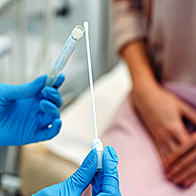Regular STI Screening Could Save Your Life

Most sexually active adults know routine sexually transmitted infection (STI) tests are an essential part of sexual health, but once people enter a monogamous relationship, they often stop getting tested.
This is one of the biggest mistakes you can make for your sexual health, as many STIs can be slow to spread or might have been missed in an earlier screening.
"Making testing a part of your routine care ensures you're capturing infections that might not have been detected during prior testing," recommended Jenelle Pierce, executive director of The STI project. "If you get tested too early after possible exposure to an STI, the infection might not be detectable."
Some people don't show symptoms
"If your partner doesn't have symptoms, it doesn't mean you or your partner are not infected," said Anne Rompalo, M.D., a board member and medical consultant for the American Sexually Transmitted Disease Association.
This is one of the most common misconceptions she has encountered in her time diagnosing and treating sexually transmitted infections. Many patients lack the sexual health knowledge to fully understand their risks of infection and how to spot the subtle warning signs of infection.
'If you get tested too early after possible exposure to an STI, the infection might not be detectable.'
"The best action you can take in regard to STIs is safe sexual practices," Rompalo added. "We understand the risks of pregnancy and use various forms of contraceptives, but no matter your prevention choices, there is no protection against sexually transmitted infections other than prophylactics. Using condoms and dental dams can greatly reduce your risk of contracting a sexually transmitted infection, but it is not a guarantee."
She has many patients in monogamous relationships who learn of their infection years later because no symptoms clued them in.
Early detection prevents permanent complications
Most STIs are treatable with antibiotics, and few become fatal. However, this doesn't mean you shouldn't be concerned about being infected. The earlier a sexually transmitted infection is found, the more likely you can avoid permanent damage to your reproductive organs. Avoiding treatment can lead to reduced fertility and, in some cases, permanent infertility.
However, many patients don't even realize they have a sexually transmitted infection until they seek fertility treatment and are diagnosed during the initial consultation.
The risk of fatal complications, while lower, still exists. Typically this comes later and is caused by secondary conditions resulting from the untreated STI. Any sexually transmitted infection will compromise your immune system and lead to illness; for instance, it can make you more prone to contracting HIV.
Sexually transmitted diseases, such as gonorrhea and chlamydia, and the STI human papillomavirus (HPV) increase your risk of developing pelvic inflammatory disease (PID), which in turn increases your risk of developing cancer.
HPV on its own can increase the risk of cancer in both men and women, causing genital warts that are treatable but not curable. While it's possible to go into remission, when genital warts flare up, it increases the risk of spreading this virus to your partner, and compromised immune systems are less likely to fight infection.
Furthermore, STDs like syphilis can easily be misdiagnosed as a skin rash and left untreated until later stages. When this infection goes untreated, neurological conditions can develop, and in later stages, it can be nearly impossible to cure and could cause a lot of irreversible damage to your mind and body.
The most obvious solution to all of these concerns is to get tested before having sex with a new partner and to continue to be tested annually to ensure early detection. If you test positive, you need to tell your partner. As tough a conversation as that is, you'll also need to navigate the stigma of having an STI and the misinformation that accompanies it.
An STI doesn't always mean infidelity
Pierce challenges this specific stigma directly: "The assumption is that the sexually transmitted infection came from your most recent partner, but there's no way to know that for sure." This can be confusing to many patients, especially if they receive annual screening.
"Full STI panels only test for certain infections, and there are quite a few common STIs that are not included in those tests," Pierce clarified. "It's rarely as simple as, 'Your partner cheated.'"
No matter the risk to your relationship, you should share information about the spread and incubation period of your STI.
This stigma is so common that many patients resist telling their partners they have a sexually transmitted infection or forgo seeking treatment. However, this means you're not only risking your own health but that of your partner.
No matter the risk to your relationship, you should share information about the spread and incubation period of your STI to educate your partner about how your infection developed and why it took so long to detect.
The more we talk about sexually transmitted infections, the better educated we can be about our sexual health and the greater our chance of reducing the risk of sexually transmitted infections.
When starting a new relationship, make STI testing part of your conversations with your partner. Be open about your sexual history, and make researching and sharing information part of your STI prevention plan.




















